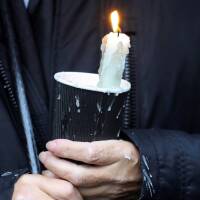Women Hit as Congo Faces Triple Threat of Coronavirus, Ebola and Measles
This story was originally published June 5, 2020 by the Thomson Reuters Foundation.
As the world races to stem the coronavirus, Democratic Republic of Congo is racing to also stop the spread of measles and a new outbreak of Ebola, leaving women delaying reproductive health needs, aid groups warned.
Congo is also facing armed conflict, bringing with it sexual violence against women who, as caregivers, are often on the frontlines of caring for the sick and at higher risk of falling ill and also often blamed for spreading these viruses.
"One of these challenges by itself is very crippling," said Robert Ghosn, head of emergency operations for the International Federation of Red Cross and Red Crescent Societies (IFRC) in DRC.
"The accumulative effect is mind boggling. Communities have to face multiple challenges at the same time," Ghosn told the Thomson Reuters Foundation.

The Ebola virus causes hemorrhagic fever and is spread through direct contact with body fluids from an infected person, who suffers severe vomiting and diarrhoea.
A new outbreak in Mbandaka, the capital of Equateur province, announced on May 31, is Congo's 11th since the virus was discovered near the Ebola River in 1976.
The country is also combating a measles epidemic that has killed over 6,000 people, and COVID-19, which has infected over 3,600 and killed 78.
More on the impact of COVID-19 around the world
"DRC's health system has been weakened by years of conflict and neglect," said Chantal Umutoni, a senior advisor with The United Nations Children's Fund (UNICEF) DRC.
"The additional pressure to tackle these outbreaks will add a burden to the already strained health systems and this will impact on the delivery of basic health services, especially for children and women," said Umutoni in emailed comments.
A study by the International Rescue Committee (IRC), a humanitarian relief organization, reported that women were afraid of being accused of having Ebola and therefore delayed or avoided treatment for reproductive health needs or bleeding.
The Ebola outbreak impacted the prevention of sexually transmitted infections (STIs), safe abortions, unintended pregnancies and newborn deaths, according to the report.
These are risks experts fear will rise amid this triple virus threat.
"Until June 2019, pregnant and breastfeeding women were not eligible for the Ebola vaccine. This left many (including front line response workers) at a greater risk of contracting Ebola," said Umutoni.
Young women often go to older women with sexual and reproductive health needs, said Umutoni, which is why they need access to information so they can transfer it to others.
"Engaging women means having them in response teams, in decision-making positions and setting up discussions for women by women," said Umutoni.
Reporting by Kim Harrisberg @KimHarrisberg; editing by Belinda Goldsmith.





